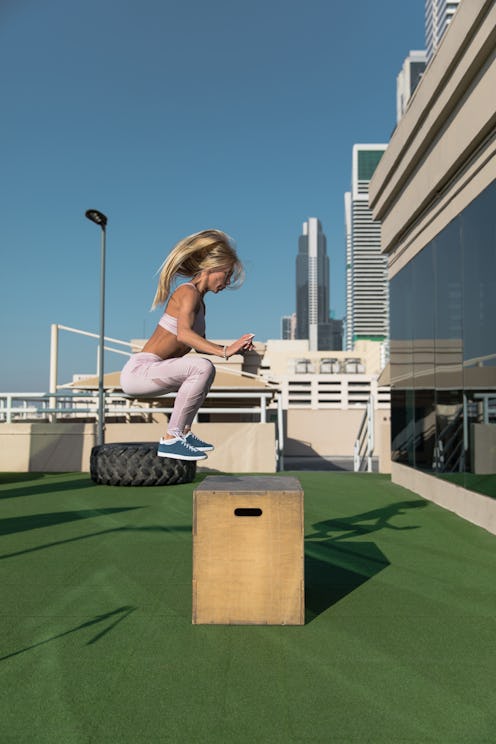Shutterstock
What Are Plyometrics?
Plyo uses explosive movements to condition your body for speed and power. "It's all about maximum force in the shortest time," says certified trainer Donna Walker. Cue burpees, tuck jumps, clap push-ups, and more to achieve plyometric workout benefits.
Shutterstock
What Are The Benefits Of Plyometrics?
Plyo is tough, says Walker (side-eyeing you, burpees). She recommends building a foundation of strength, endurance, coordination, and mobility before trying it in order to avoid injury and make the most of the workout.
Shutterstock
It Builds Endurance
All those explosive jump lunges and rapid-fire mountain climbers will get your heart pumping to improve your stamina over time, says Barry's Bootcamp instructor Joe Allen. Who knew you could boost cardio without having to run for miles?
Shutterstock
It Strengthens Muscles
Plyo exercises are intense and repetitive. This loads your tissues with force to build stronger muscles, Walker tells Bustle. "It strengthens at the same time as you’re challenging your cardiovascular system," she says. Talk about a dynamic duo.
Shutterstock
It Boosts Power And Speed
Plyo movements rapidly stretch and shorten your muscle fibers, which boosts power and speed as your muscles learn to work more quickly and efficiently, says Allen. Say hello to higher jumps, faster sprints, and sharper turns.
Shutterstock
It Strengthens Joints And Tendons
Just like your muscles get stronger as they stretch and shorten, so do your tendons, says Allen. And stronger connective tissue helps stabilize your joints during explosive plyo sessions.
Shutterstock
It Helps Prevent Injury
That extra muscle-tendon strength and joint stability can stave off injury, according to Walker. Just make sure to start slow and practice good form so you don't overdo it and accidentally cause injury, she says.
Shutterstock
Safety First
Plyometrics put a lot of force and stress on your joints, so hold off if you have any pain or are rehabbing an injury. The high-powered exercises require all the stability and control that you've got, says Walker. Make sure your body is primed for those burpees.
